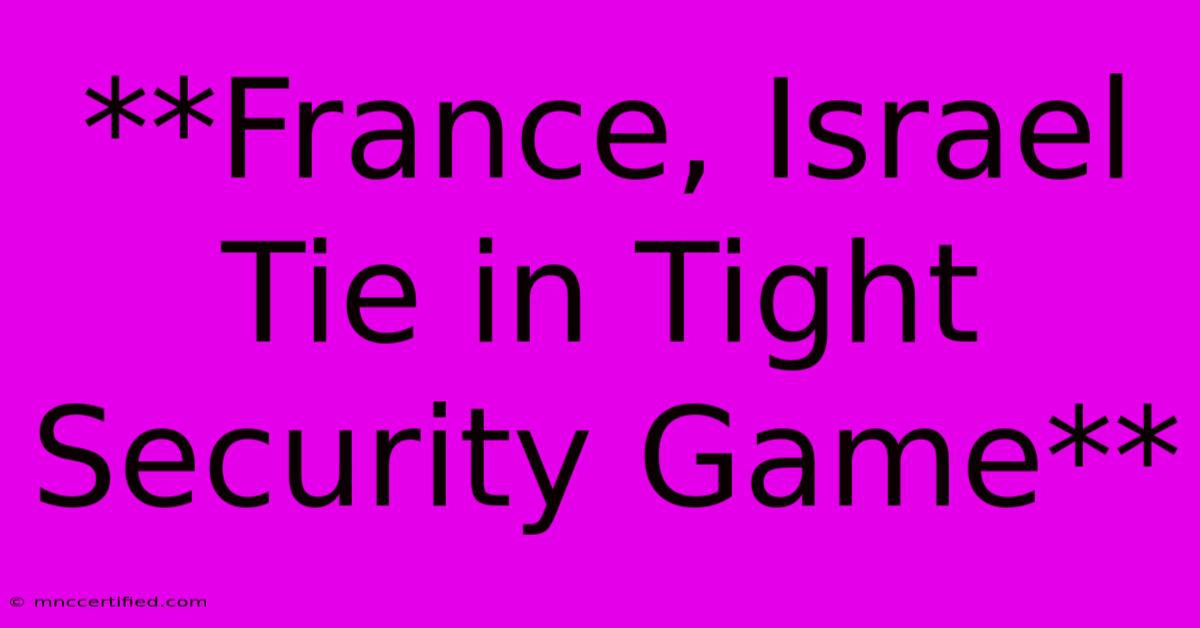**France, Israel Tie In Tight Security Game**

Table of Contents
France, Israel Tie in Tight Security Game: A Complex Relationship
France and Israel, despite geographical distance, share a surprisingly intricate relationship, particularly in the realm of security. This connection, forged through shared threats and strategic interests, is often complex and nuanced, marked by both cooperation and competition. Understanding this dynamic is crucial to comprehending the geopolitical landscape of the Middle East and Europe.
Shared Threats: Terrorism and Regional Instability
Both France and Israel face significant threats from terrorism, making security cooperation a paramount concern. Islamic extremism, in its various forms, poses a direct danger to both nations. This shared threat has led to intelligence sharing, joint counter-terrorism exercises, and technological collaborations in areas like cybersecurity and surveillance. The rise of ISIS, for example, spurred increased intelligence cooperation between the two countries, leading to the exchange of crucial information to disrupt terrorist plots.
Intelligence Sharing and Counter-Terrorism Efforts:
- Joint operations: While rarely publicized, intelligence sharing between French and Israeli security services is believed to be significant, particularly in identifying and tracking terrorist networks operating across continents.
- Technological advancements: Both countries are leaders in developing advanced security technologies, and collaborations in this field are likely to continue and grow. This includes areas like facial recognition, drone technology, and data analytics.
- Cybersecurity: With the growing threat of cyberattacks, both nations are actively cooperating in enhancing their cybersecurity infrastructure and sharing best practices.
Strategic Interests: Regional Power Dynamics
Beyond the immediate threat of terrorism, both France and Israel have overlapping strategic interests in maintaining regional stability. Israel’s security is intrinsically linked to the stability of its immediate neighbors, while France seeks to maintain its influence in the Mediterranean and broader Middle East. This shared interest fosters cooperation, even amidst disagreements on specific policy issues.
Maintaining Regional Stability:
- Containing Iranian influence: Both countries view Iran's regional ambitions with concern and have engaged in efforts to counter Iranian influence in various regional conflicts. This shared concern has provided a common ground for discussions and coordination.
- Supporting regional allies: Both countries have provided support to various regional allies, sometimes coordinating efforts to stabilize fragile governments and counter the influence of extremist groups. This collaboration is often discreet but significant.
Areas of Tension: Policy Divergences and Historical Context
Despite the significant cooperation, tensions exist between France and Israel. These tensions stem from differing perspectives on the Israeli-Palestinian conflict and broader Middle Eastern policy. France, for example, has historically maintained a more critical stance towards Israeli settlement policies in the occupied territories, leading to occasional disagreements.
Navigating Differences:
- The Israeli-Palestinian conflict: While both countries acknowledge the need for a two-state solution, their approaches and policy positions often differ. France has been a vocal advocate for Palestinian statehood and has historically championed the peace process through diplomatic channels.
- Nuclear proliferation: While both countries are concerned about the proliferation of weapons of mass destruction, they may not always align on specific strategies for dealing with this threat.
The Future of Cooperation: A Balancing Act
The relationship between France and Israel is a delicate balance between cooperation and competition. The shared threats of terrorism and regional instability drive significant cooperation in intelligence sharing and counter-terrorism efforts. However, differing policy positions on the Israeli-Palestinian conflict and broader regional issues introduce friction. This complex interplay will likely continue to shape their security relationship in the years to come. The future will hinge on their ability to manage these differences while maintaining a strong security partnership crucial to addressing shared challenges.
Keywords: France, Israel, security cooperation, counter-terrorism, intelligence sharing, regional stability, Israeli-Palestinian conflict, Iran, Middle East, geopolitical, terrorism, cybersecurity.

Thank you for visiting our website wich cover about **France, Israel Tie In Tight Security Game**. We hope the information provided has been useful to you. Feel free to contact us if you have any questions or need further assistance. See you next time and dont miss to bookmark.
Featured Posts
-
Teens Hike To Support Children In Need Charity
Nov 15, 2024
-
Rookie Stats Daniels Vs Robert Griffin Iii
Nov 15, 2024
-
Venezuela Vs Brazil Expected Lineups And Teams
Nov 15, 2024
-
Hurts 1 Yard Td Eagles First Lead
Nov 15, 2024
-
Paddy Mc Guinness C Beebies Bedtime Story
Nov 15, 2024